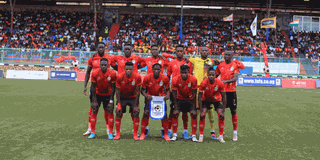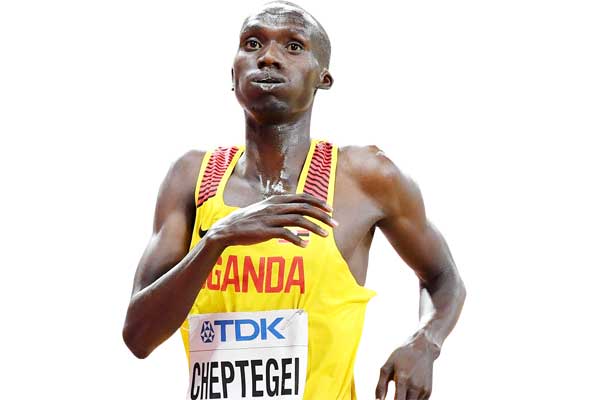Uganda hosting Afcon: A possibility or pipedream?

Uganda Cranes players pose for a photo prior to kickoff of their Afcon 2023 qualifier against Niger at the St Mary's Stadium in Wakiso in early June. PHOTO/HANDOUT
Currently, Uganda has no stadium that fully meets all the standards as stipulated by Caf in case a member bids to host the Africa Cup of Nations.
Recently, Fufa president Eng. Moses Magogo and the National Council of Sports (NCS) general secretary Dr Bernard Ogwel lit a fire underlining Uganda’s intentions to host the 2027 Africa Cup of Nations.
Cameroon hosted the last final earlier this year while Ivory Coast and Guinea are planned to host the next two editions.
With about five years to the 2027 edition, Caf is expected to open the bidding process this month and close in September.
Already, Namibia and Botswana have expressed interests to request the rights from Caf, there has been word that Tanzania are interested, too.
Magogo revealed that President Yoweri Museveni gave a green light for Fufa to explore a possibility of co-hosting alongside Tanzania.
“The Speaker of Parliament (Rt. Hon. Anita Among) confirmed that the president gave the green light for us to make a joint bid with Tanzania to host the 2027 Africa Cup of Nations,” Magogo told listeners in his weekly show on Fufa FM.
The Fufa boss first made similar comments in 2017 as he hoped the country would host the 2025 edition. The federation also bid and won the rights to host the 2020 Africa Beach Soccer but later withdrew because of lack of facilities.
Since its inception in 1957, 19 countries have hosted the Afcon finals.
The bidding process
The bidding process involves several phases. First, Caf opens the bidding process and invites member associations to apply. The interested associations receive the list of requirements and terms of reference regarding the whole process.
According to a source at Caf, this document is not for public consumption but only available with strict rules to the associations that expressed interest.
The associations then submit their detailed bid books before Caf makes a shortlist from the submissions. The process is conducted by a specialised company that Caf awards the tender for the job.
Caf’s committee in charge with organizing the Afcon makes on-site visits to do a technical evaluation. The report is then handed to the executive committee for the final decision. We take a look at some of the requirements;
Government commitment
First of all, the respective government has to submit written assurance that the tournament will be held successfully without any glitches.
Normally, for tournaments of such magnitude, the governments have to compromise their normal protocol.
The letters comprise a memorandum signed by cabinet that has specific commitments from the lying ministries that touch on several issues including sports, security, health, transport, and finance, foreign and internal affairs among others.
For example; the government must commit to free flow of Caf executive members, staff, teams and fans without any issues and assure of their safety during the entire period of stay.
They must also relax some financial controls to allow the different stakeholders to carry unspecified amounts of money without trouble. The president personally signs this document.
A bid without the government commitment is dead on arrival.
First-class facilities
With the new 24-team format comes more costs. Every host city is expected to have a five-star rated hotel for the Caf members and staff and at least four-star hotels for the teams.
Up to four teams can share a hotel provided all the set requirements are met. A minimum of six stadiums are required and twelve training grounds, two near each stadium.
An airport facility in the main city and additional facilities in host cities that are about 200km away from the main.
The country is required to provide a good transport network between the stadiums, training grounds and the hotels. The country is also required to provide police security for all the officials, teams and Caf guests.
Stadium requirements
As stated earlier, Caf requires at least six stadiums with two training grounds near each.
The main stadium for the opening and closing ceremonies should be at Namboole’s level of at least a 50, 000-seater with installed seats, one of 40,000 that will host one semi-final and four others of at least 20,000 sitting capacity.
The stadium must be international class in that they have a smooth playing surface with good drainage, well-separated media tribunes and a mixed zone with fully functional internet services, anti-doping rooms, four changing rooms, transport infrastructure and a working lighting system for high-definition video production.
Currently, Uganda has no stadium that fully meets all the standards.
The cost
The respective government must commit to facilitating all the costs. It was reported that Rwanda spent over US$21 million (approximately Shs75b) to get facilities ready for the 2016 Africa Nations Championship, the second-grade tournament to Afcon.
For Cameroon, the last host, Africa Business reported that the government sunk over $885 million (approximately Shs3.186tr) to ensure a smooth hosting.
About $280 million went into constructing theOlembe stadium that hosted the final.
It is estimated that the country could’ve fetched something between $150 to 200 million in revenue from the month-long showpiece.
Sticky challenge
The issue of hosting the continental tournament has not been a straightforward one. Cameroon was initially set to host the 2019 edition but because of slow preparations, the rights were stripped and awarded to Egypt.
They were instead rewarded the 2021 version with Ivory Coast and Guinea adjusting forward by a tournament.
In 1996, Kenya won a bid to host but it was later pushed to South Africa. Zimbabwe was selected for 2000 but it eventually ended in Ghana and Nigeria for the first ever tournament to be hosted by two nations.
The 2013 final was withdrawn from Libya due to civil war and traded years with South Africa which was initially set to host the 2015 one.
Due to the protracted war in Libya, Morocco was selected to host the 2017 edition but they later withdrew due to the Ebola pandemic and the final took to Equatorial Guinea.
That affected the 2017 final that was eventually hosted in Gabon. Kenya, Uganda and Rwanda expressed interest for a joint bid but didn’t submit.




